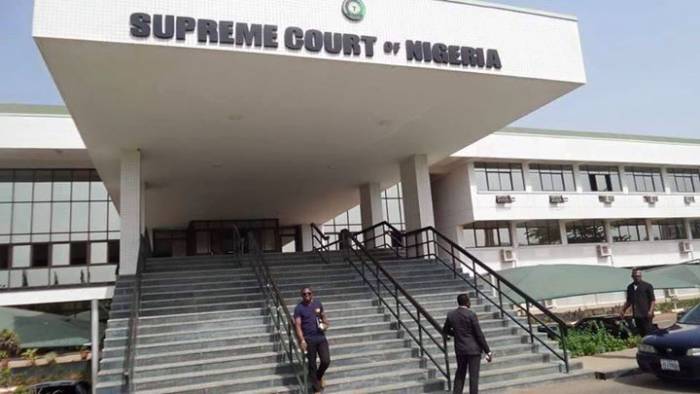Crime & Law
Anxiety mounts as S’Court rules on 16 govs’ suit against EFCC today

The Supreme Court of Nigeria is set to deliver a highly anticipated judgment today in the case filed by 19 state governments challenging the constitutionality of the laws establishing the Economic and Financial Crimes Commission (EFCC).
The ruling will determine whether the EFCC’s creation and operations comply with the Nigerian Constitution.
The states argue that the EFCC Establishment Act of 2004, based on the United Nations Convention against Corruption, violated Section 12 of the 1999 Constitution, which requires the majority of state houses of assembly to approve such conventions before being integrated into Nigerian law.
The plaintiffs claim that this process was not followed, making the EFCC Act unconstitutional for states that did not consent.
The suit was initiated by the Kogi State government and joined by the Ondo, Edo, Oyo, Ogun, Nasarawa, Kebbi, Katsina, Sokoto, Jigawa, Enugu, Benue, Anambra, Plateau, Cross-River and Niger.
A seven-member panel of justices, led by Justice Uwani Abba-Aji, on Tuesday, fixed October 22 for a hearing.
The EFCC, however, expressed dismay over the call for the overhaul of their institution, stating that those pushing for such are “feeling the heat of its work.”
The EFCC’s Director of Public Affairs, Wilson Uwujaren, disclosed this in an interview on Channels Television’s The Morning Brief programme on Monday.
Uwujaren defended the significance of the commission, stating that Nigerians needed to fight against corruption.
“We are shocked by what is happening. Nigerians should see through this shenanigan and oppose it because I don’t see how this country can survive without the EFCC, given the kind of corruption problem that we have. Nigeria cannot do without the EFCC.
READ ALSO: Supreme Court fixes date for 16 governors’ suit seeking to declare EFCC illegal
“I am worried that, with the kind of problem we have with corruption in this country, some people would go to court to challenge the legality of the EFCC.
Agbakoba, a former President of the Nigerian Bar Association, wrote to the National Assembly about constitutional issues related to law enforcement agencies in Nigeria and factors inhibiting the government’s objective of abolishing corruption, as stated in Section 13 of the Constitution.
In two separate letters to the Senate and House of Representatives, dated October 14, 2024, he stated that the EFCC was an unlawful organisation that he believed was “unconstitutionally established.”
He said, “I very strongly believe the EFCC is unconstitutionally established. The powers under which it was established go beyond the powers of the National Assembly. The EFCC is an unlawful organisation.”
However, three days later, Falana, a human rights activist, in his letter to the National Assembly, opposed Agbakoba’s view.
He insisted that the former NBA president’s position was based on the premise that the establishment of the EFCC violated the basic principles of federalism.
The Executive Director of Africa Center for Media Information and Literacy, Chico Onumah, reacting to the suit, noted that there is nothing unconstitutional about EFCC as the laws that brought about its existence went through due process.
“The commission was set up by an Act over two decades ago and I don’t imagine that there is anything wrong with that.
“As far as I know, the laws that led to the setting up of the commission went through the due process.
“The EFCC I know is a legal institution, the laws that set it up are there like ICPC and it went through the normal process. What is unconstitutional about EFCC? The constitution empowers the National Assembly to pass laws like this so I don’t see anything unconstitutional about this.
“They are legal institutions and I see nothing unconstitutional about the anti-corruption agencies,” he said.
Speaking further he noted that the EFCC had been doing its fair share in the fight against corruption, even though there was room for improvement.
“They have been able to fight corruption. You can’t imagine where we are coming from and where we are today. Corruption is one of the biggest challenges in this country and whether we like it or not, these agencies have contributed their quotas.
“Of course, there’s room for more to do better but within the limited resources and manpower, I think they’ve done fairly well,” he added.
The Deputy Director of the Socio-Economic Rights and Accountability Project, Kolawole Oluwadare, stressed that the functionality and constitutionality of EFCC were not in doubt.
He said, “The constitutionality of the EFCC is not in doubt. The functionality of EFCC as an anti-corruption agency is also not in doubt.
“If the legal argument was made four years ago on the constitutionality of EFCC, the question that Nigerians who are interested in the transparent and economic growth of Nigeria on the state governors suit is to ask what is the end game and what are they afraid of?”
The Executive Director of the Civil Society Legislative Advocacy Centre, Auwal Rafsjani, condemned the state governments’ action, stating that the suit threatened not only the fight against corruption but also the autonomy of local governments—a fundamental pillar of grassroots democracy.
He said, “The recent legal battles waged by these governors represent a blatant disregard for the rule of law and an attempt to undermine Nigeria’s progress in establishing institutions that hold public officials accountable.
“This calls for deep concern and unequivocal condemnation of the recent actions of some state governors targeted at EFCC, Nigerian Financial Intelligence Unit and by implications other anti-corruption agencies in the country, such as the Independent Corrupt Practices and Other Related Offences Commission, the Code of Conduct Bureau and key law enforcement agencies like the Nigeria Police Force; preparatory to the commencement of full implementation of the recent Supreme Court judgment with regards to local government autonomy in Nigeria.”
(Punch)





















